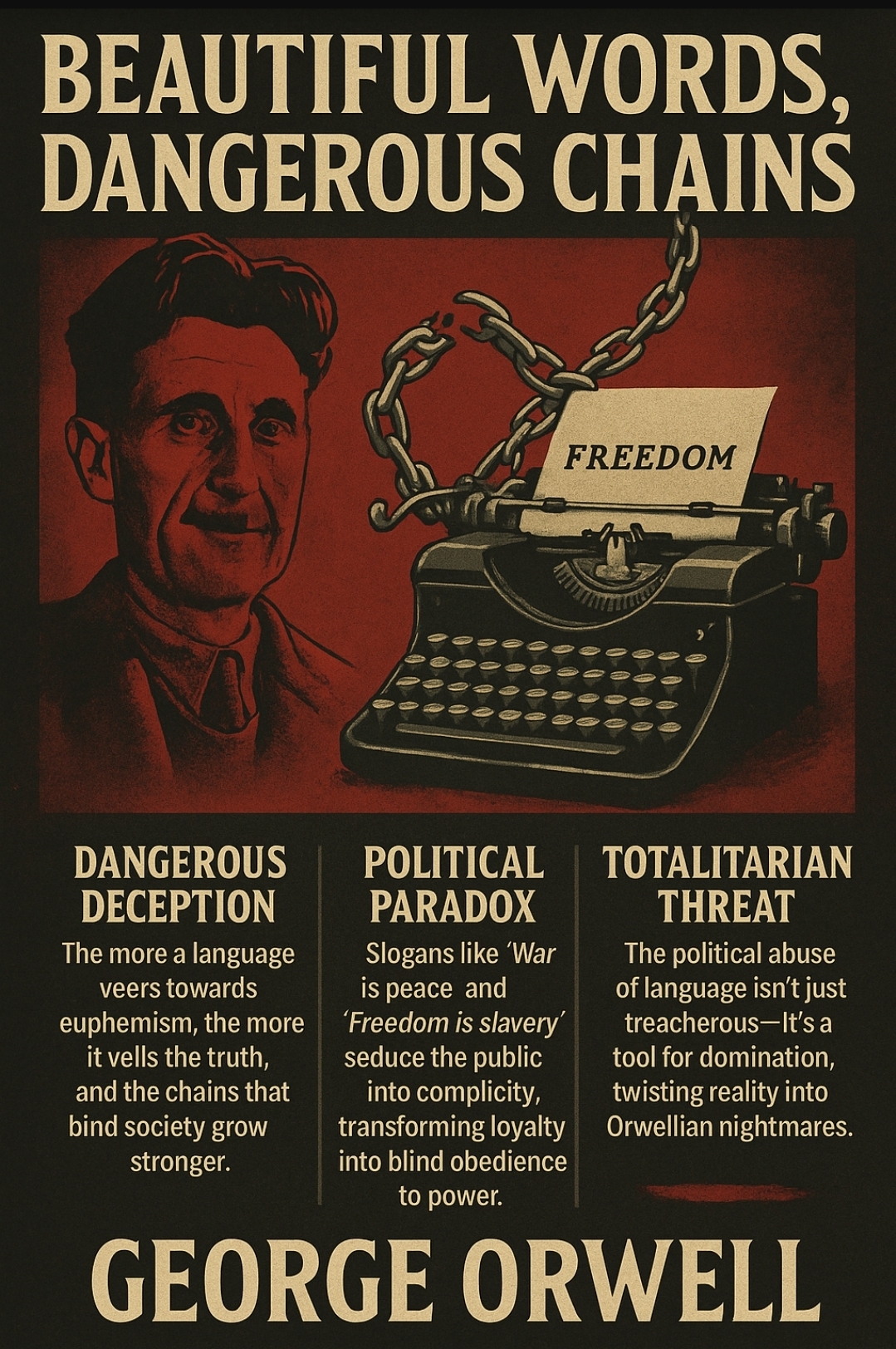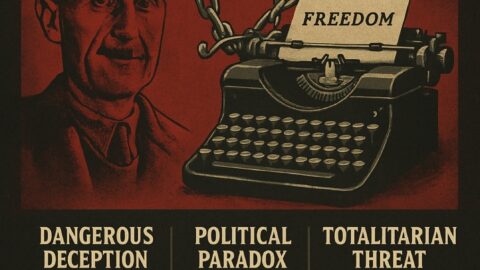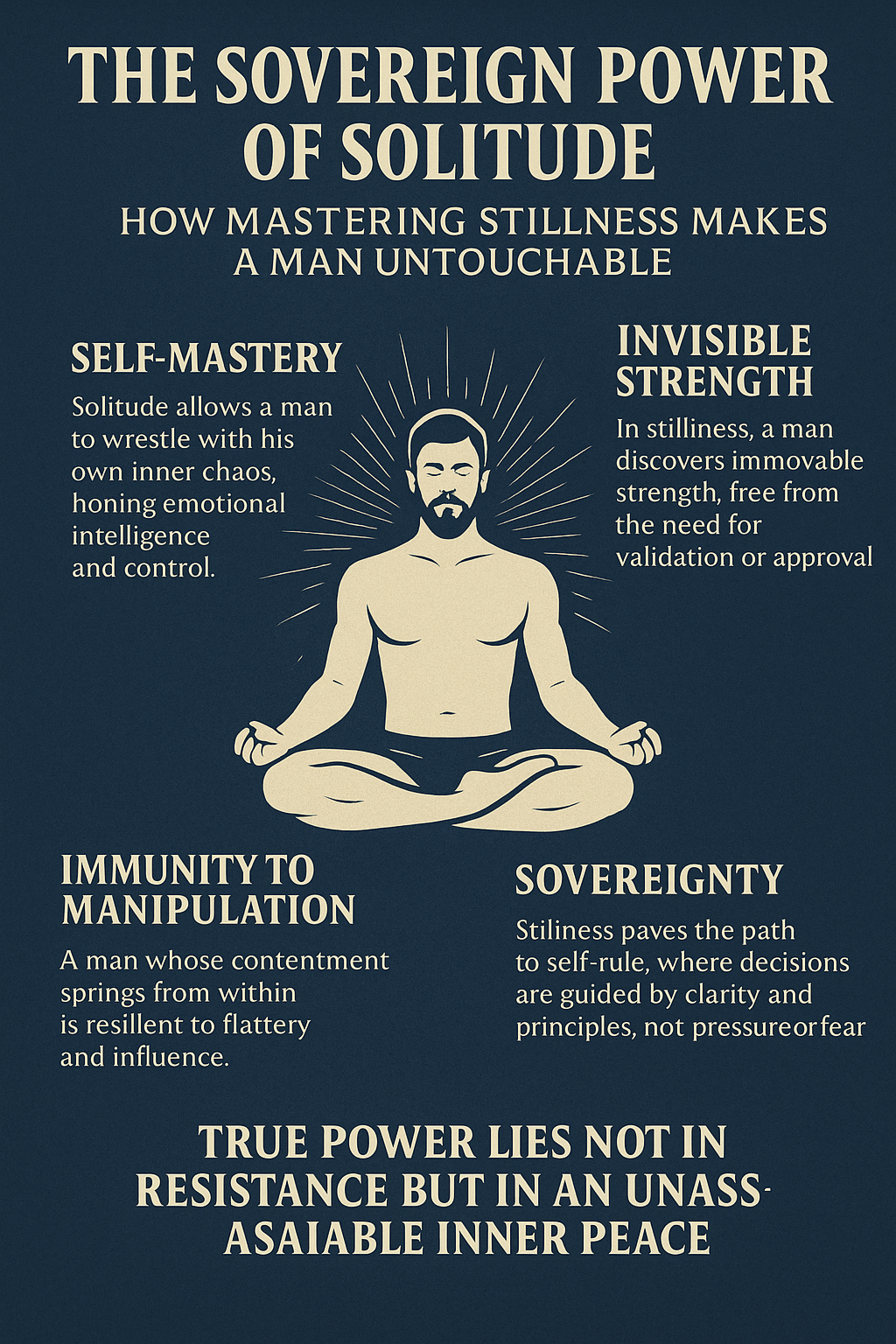We like to think that our thoughts are our own. That the words in our heads spring from original insight, untouched by outside influence. Yet George Orwell argued the opposite: that the very language we use to define reality is rarely ours. It is given to us, shaped by culture, politics, media, and institutions long before we ever speak it.
The Seduction of Elegant Language
Beautiful words move us. They stir emotion, inspire love, fuel outrage, and ignite revolutions. But the more stirring the language, the less likely we are to question its meaning. Orwell warned that elegant phrasing often hides brutality. Politicians don’t admit to killing civilians—they “neutralize threats.” Corporations don’t spy—they “enhance user experience.” Governments don’t invade—they launch “peacekeeping missions.”
Language is never neutral. It frames the way we see the world. One person is a “freedom fighter,” another a “terrorist”—depending on who is speaking. The person is the same, but the label reshapes perception. The masses are not controlled by force, Orwell showed us, but by framing.
Newspeak and the Limits of Thought
In 1984, Orwell imagined “Newspeak”—a language engineered to shrink the range of thought itself. Remove the word “freedom,” and you remove the idea of freedom. Erase “rebellion,” and organizing one becomes impossible. Through linguistic restriction, contradictions become normal, and independent thought collapses.
Today, we live with early echoes of Newspeak. Our culture is full of mantras like “stay in your lane,” “trust the science,” “speak your truth.” These sound wise, but often simplify complex realities into slogans that end inquiry instead of deepening it.
Institutions and the Machinery of Manipulation
Governments, corporations, schools, and platforms all weaponize language.
- Governments sanitize war and surveillance. “National security” cloaks privacy invasion; “collateral damage” hides civilian deaths.
- Corporations market exploitation as empowerment, pollution as “offsets,” and addiction as lifestyle.
- Education often teaches students the “right terms” instead of critical inquiry, turning words like equity or progress into moral shields against debate.
- Social media algorithms filter vocabulary, deciding which words, ideas, and voices are amplified or erased.
Control of language – control of conversation – control of culture – control of people.
Our Role in Self-Censorship
We don’t need censors when we censor ourselves. Out of fear of labels—rude, insensitive, divisive—we choose silence. We trade clarity for acceptance. We wear the chains not because they’re forced on us, but because they come gift-wrapped in elegant words.
The Trap of Beautiful Lies
The most dangerous lies are not the obvious ones, but those that sound morally noble. Orwell feared not the brute force of totalitarianism but its seduction—the way tyranny could dress itself in phrases like “unity,” “progress,” and “safety.” Too often, we mistake elegance for truth and discomfort for danger.
Justice, freedom, and progress are sacred values, but precisely because they are sacred, they’re easily manipulated. To silence someone today, you don’t need an argument. You only need to accuse them of being “anti-progress” or “on the wrong side of history.” The word itself does the work.
Reclaiming Language, Reclaiming Thought
To escape this cage, Orwell’s lesson is clear:
- Radical awareness – interrogate slogans, headlines, and mantras. Who benefits if you accept them without question?
- Intellectual courage – engage with discomfort, read opposing views, and embrace the friction of debate.
- Reclaim language – define words like freedom, truth, justice, and love for yourself, based on experience and evidence, not fashion.
- Accept the cost – honesty will bring labels and misunderstanding, but clarity of mind is worth the price.
Final Word
Orwell didn’t write to depress us. He wrote to wake us. The cage of language is real, but the key is within reach. Think clearly. Speak honestly. Resist beautifully. And never let the elegance of a word blind you to the truth it may be hiding.
Here is a point-by-point breakdown of the transcript’s ideas and examples:
Core Thesis
- Language shapes thought. Much of what we “think” is pre-shaped by borrowed words, frames, and labels.
- Orwell’s warning: Not only about authoritarianism, but about language as a control system—weaponized, romanticized, disguised.
Why “beautiful words” are dangerous
- The more a word stirs emotion, the less we interrogate its meaning.
- Politicians/ideologues use elegant language to conceal, not clarify (Orwell, Politics and the English Language).
Euphemism & Framing (examples)
- Euphemisms: “neutralized threats” (killed civilians), “fiscally challenged” (poor), “your data helps us serve you” (surveillance).
- Framing flips perception: “freedom fighter” vs “terrorist” can describe the same person; labels steer moral judgment.
Newspeak & thought limits (from 1984)
- Reduce vocabulary → reduce thinkable ideas (no “freedom,” no freedom concept).
- Doublethink normalizes contradiction; language rewires the mind, not just the mouth.
Modern echoes & buzzwords
- Pervasive calls “not to offend” + fashionable phrases: WMDs, collateral damage, enhanced interrogation, thought leader, empowerment, safe spaces.
- Vagueness = unchallengeable; “You can’t fight what you can’t name.”
- Everyday mantras: “stay in your lane,” “trust the science,” “speak your truth”—ask whether they invite inquiry or shut it down.
Propaganda that feels like common sense
- Propaganda in your own language feels like morality/truth.
- Language choices shape cognitive range—what you’re even capable of thinking.
The machinery of manipulation (institutions)
- Governments: sanitize power (“peacekeeping mission,” “national security” for war/spying).
- Corporations: launder harm (“lifestyle choices,” “empower communities,” “carbon offsets”).
- Education: teaches approved terms over inquiry—words like equity, diversity, inclusion, privilege, harm, safety, progress become moral shields that can pre-empt debate.
- Digital platforms: algorithms filter vocabulary (bans, shadowbans, boosts); those in power define “misinformation,” “hate speech,” “unsafe.”
- Control pipeline: vocabulary → conversation → culture → you.
Our role: self-censorship
- We pre-edit to avoid labels and social risk.
- Choose acceptance over clarity, silence over truth; “beautiful words” become voluntary chains.
Silencing truth with elegance
- Most dangerous lies: the ones that sound wise/compassionate.
- We conflate elegance with truth and discomfort with danger.
- Sacred terms (justice, freedom, identity, progress) can be weaponized: accuse someone of being “anti-progress/on the wrong side of history” to end argument.
- Truth is often uncomfortable; demanding beauty makes us vulnerable to beautiful lies.
Self-audit prompts
- When did you last change your mind because something was truer, not prettier?
- Are you seeking emotional affirmation or reality?
- Are you in echoes (agreeable words/people) or friction (debate, doubt, evidence)?
Escaping the cage (reclaiming thought)
- Radical awareness: interrogate slogans/headlines/social scripts. Ask: What does this mean? Who benefits if I accept it?
- Intellectual courage: read opponents, tolerate discomfort; truth lives in friction, not unanimity.
- Reclaim language: define freedom, justice, progress, love for yourself (experience + reflection + evidence).
- Accept the cost: expect misunderstanding/labels; choose truth over approval—that’s real mental freedom.
Final call
- Think your own thoughts; don’t rent them from fashion.
- Define your terms or others will define you.
- Use the “key”: clear thinking, honest speech, beautiful resistance—and never let verbal elegance hide the underlying reality.
Quick self-defense checklist (use anytime)
- “What’s the plain-speech version of this phrase?”
- “Which alternative labels would flip my reaction?”
- “Is this term defined or assumed?”
- “Am I avoiding a topic because the words to discuss it are missing/forbidden?”
- “If this argument arrived without buzzwords, would I still agree?”






